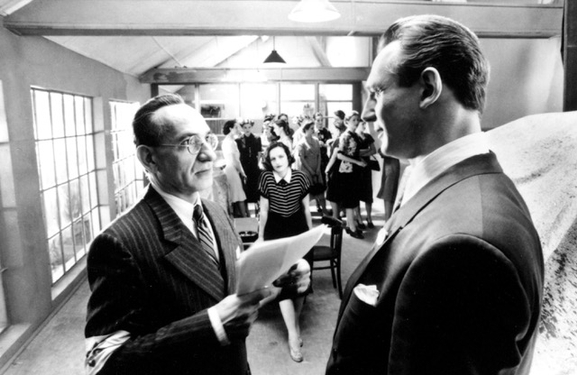Alfonso Cuaron’s “Roma” has scored early plaudits from critics’ organizations, including best picture of the year from the New York Film Critics Circle and the Los Angeles Film Critics Assn. Times critics Justin Chang and Glenn Whipp, members of the L.A. organization, sat down to discuss what the critics picks say about the season so far.
Justin Chang: As of this writing, Glenn, I imagine that “Roma,” Alfonso Cuaron’s shimmeringly beautiful portrait of his 1970s Mexican childhood, is just a few more prizes away from being dismissed in some quarters as a tediously overrated awards season front-runner. I can hardly fault our colleagues for rallying around a black-and-white Spanish-and-Mixtec-language neorealist epic — one that needs all the acclaim it can get to overcome resistance from the subtitle-averse and Netflix-allergic sectors of the motion picture academy.
You and I were both present for Sunday’s six-hour L.A. Film Critics Assn. meeting, along with several Times colleagues. And what excites me especially about our slate of winners is that “Roma,” consensus favorite though it may seem, was hardly our only way of acknowledging what should be obvious to all at this point: This was an extraordinary year for world cinema.
I would go further and state something equally obvious if possibly reductive: This was an extraordinary year for movies directed by and featuring Asian and Asian American talent. LAFCA’s runner-up for best picture was “Burning,” the gripping psychological thriller from South Korean writer-director Lee Chang-dong, which also drew supporting actor honors for Steven Yeun’s marvelously slippery performance. “Burning” also shared the foreign-language film prize in a tie with “Shoplifters,” the Palme d’Or-winning drama from Japanese master Hirokazu Kore-eda.
What else? Chloe Zhao, the Chinese-born, U.S.-based director of the wrenching drama “The Rider,” won the New Generation prize for a breakthrough talent. “Minding the Gap,” a trenchant documentary from Chinese American filmmaker Bing Liu, won the editing prize. It also placed second for best nonfiction film after “Shirkers,” Sandi Tan’s twisty and beguiling tale about the narrative feature she shot in her native Singapore in the early ‘90s.
Nobody foresaw this confluence of outcomes. LAFCA, which includes about 50 members of widely divergent tastes and sensibilities, is far too unwieldy to execute an agenda even if it had one. I don’t think it dawned on anyone until we were packing up that we had just given prizes to three female directors — Zhao, Tan and of course Debra Granik, worthy winner of LAFCA’s directing prize for her hushed and intimate drama “Leave No Trace.”
I know it’s poor form to diss other folks’ awards, but in a year when the Hollywood Foreign Press Assn. couldn’t find room for a single female filmmaker in best director, I will pat us on the back, just a bit, for offering a principled corrective.
Glenn Whipp: You are right, Justin. It was only after we finished and the circulation returned to my legs — six hours! — that I realized the breadth of our selections. LAFCA has a well-earned reputation for casting a wide net. “Roma” follows Michael Haneke’s “Amour” as the second foreign-language feature that we’ve named best picture this decade. That’s something that the motion picture academy has never done in its 90-year history, though I think Cuaron’s “Roma” could break that barrier this year.
While I acknowledge the hurdles facing “Roma” that you mention, I think this new academy — nearly 2,400 members invited these past three years, with many more women, people of color and international filmmakers voting — will continue to redefine what kind of movie can win best picture. We saw that with “Moonlight.” I think we’ll see it with “Roma.”
What I’ve never seen in my 20 years of voting with this group was a situation quite like we encountered Sunday in which members struggled over where to place several worthy actresses. There was the terrific trio from “The Favourite” — Olivia Colman, Rachel Weisz and Emma Stone — along with Thomasin McKenzie, whose sensitive and thoughtful performance was an essential part of Granik’s “Leave No Trace.” Many LAFCA members loved their work and wished to see it honored, hoping we might reach some consensus, before voting, about whether their turns were lead or supporting.
I think all four are leads. But Stone, Weisz and McKenzie are all being campaigned by their studios in supporting, under the calculated (but also correct) assumption that their nomination chances are better. While I’m not deeply invested in what Oscar campaigners or Oscar voters do — and if McKenzie earns an Oscar nomination and more people see Granik’s powerful film because of it, then huzzah — I do care what we do. And in this case, I think we got it right. It just took a little extra time.
Chang: The category confusion became a running joke as the day went long: One member cast a vote for (the wonderful!) “Paddington 2” as best documentary, while another jokingly mentioned Olivia Colman during the lead actor balloting. But yes, I agree with you that the four actors you mentioned are all leads, and I also think we got it right in the end. Without delving too much into the headache-inducing procedural minutiae, I will simply note that Colman and McKenzie had a lot of love in both actress categories. And Colman of course ultimately prevailed in lead actress over her nearest competitor, Toni Collette (“Hereditary”).
That a movie can in fact have multiple leads is an uncontroversial fact, albeit one that it often suits awards strategists to ignore. The debate becomes especially fascinating with regard to “The Favourite,” in part because Yorgos Lanthimos’ delicious movie — which itself proved highly competitive in our races for picture, screenplay and production design — is all about three women jockeying for position. I’m reminded of “All About Eve,” a movie to which “The Favourite” bears no small resemblance, and especially the long-held assumption that Anne Baxter’s lead actress nomination ultimately cost Bette Davis the Oscar in the same category.
The carefully structured campaigns for Colman, Stone and Weisz seem designed to ensure that Colman — the movie’s dominant presence, in dramatic impact if not screen time — doesn’t fall victim to the same fate and also to ensure that all three of them get recognition. I’m glad we took the time to hammer out the particulars and reach our own decisions, though the fact that we had to have a debate just shows how easy it can be to follow whatever parameters the studios dictate. It also reminds us that, as much as we critics like to pride ourselves on our integrity and independence, we know all too well that our prizes play a role, however small, in the all-consuming machinery of awards season.
That machinery is often creaky and dubious, as our own gloriously subjective voting process bears out. Over the course of the day, we found ourselves pondering all kinds of annoying questions: How could “Burning” come in second for best picture but then tie with “Shoplifters” in foreign-language film? Why even give a separate foreign-language film prize if we’ve already stated that the top two movies of the year were made in other countries? How could anyone possibly have voted for “Green Book”? OK, only a few did — but that’s still too many.
Whipp: Yes, there were votes for “Green Book” — and “A Star Is Born” too. (My favorite came from the Wall Street Journal’s Joe Morgenstern, who prefaced his first-place lead actress vote for Lady Gaga by observing that we did seem to be underestimating a little movie that a few people really, really like.)
I mention this because critics groups like LAFCA are often derided for being “out of touch” with their “oddball” choices. But if all that were true, then “Black Panther” wouldn’t have finished in the top five of our best picture voting. Hugh Grant wouldn’t have been the supporting actor runner-up for his delightful turn as the villain in “Paddington 2.” And someone wouldn’t have championed Blake Lively’s funny, caustic work in “A Simple Favor,” hoping against hope that more than a few others in the group put her among their top choices. (That would be me. And I’m heartbroken.)
But then, with LAFCA, you never know what suggestions will take hold and gain momentum. I wouldn’t have guessed that Liu’s “Minding the Gap,” which is available on Hulu after a small theatrical run in August, would have won our editing prize.
If you’re a member of the film academy’s documentary branch, perhaps these awards — following honors from the New York Film Critics Circle and nominations for the Spirit Awards — will serve as a gentle nudge to consider Liu’s movie. Because, as you noted, Justin, we critics do like to believe we play a role this season, even if it’s just to call attention to an unforgettable movie that’s resting in millions of people’s streaming accounts, waiting to be discovered.
———
©2018 Los Angeles Times
Visit the Los Angeles Times at www.latimes.com
Distributed by Tribune Content Agency, LLC.












